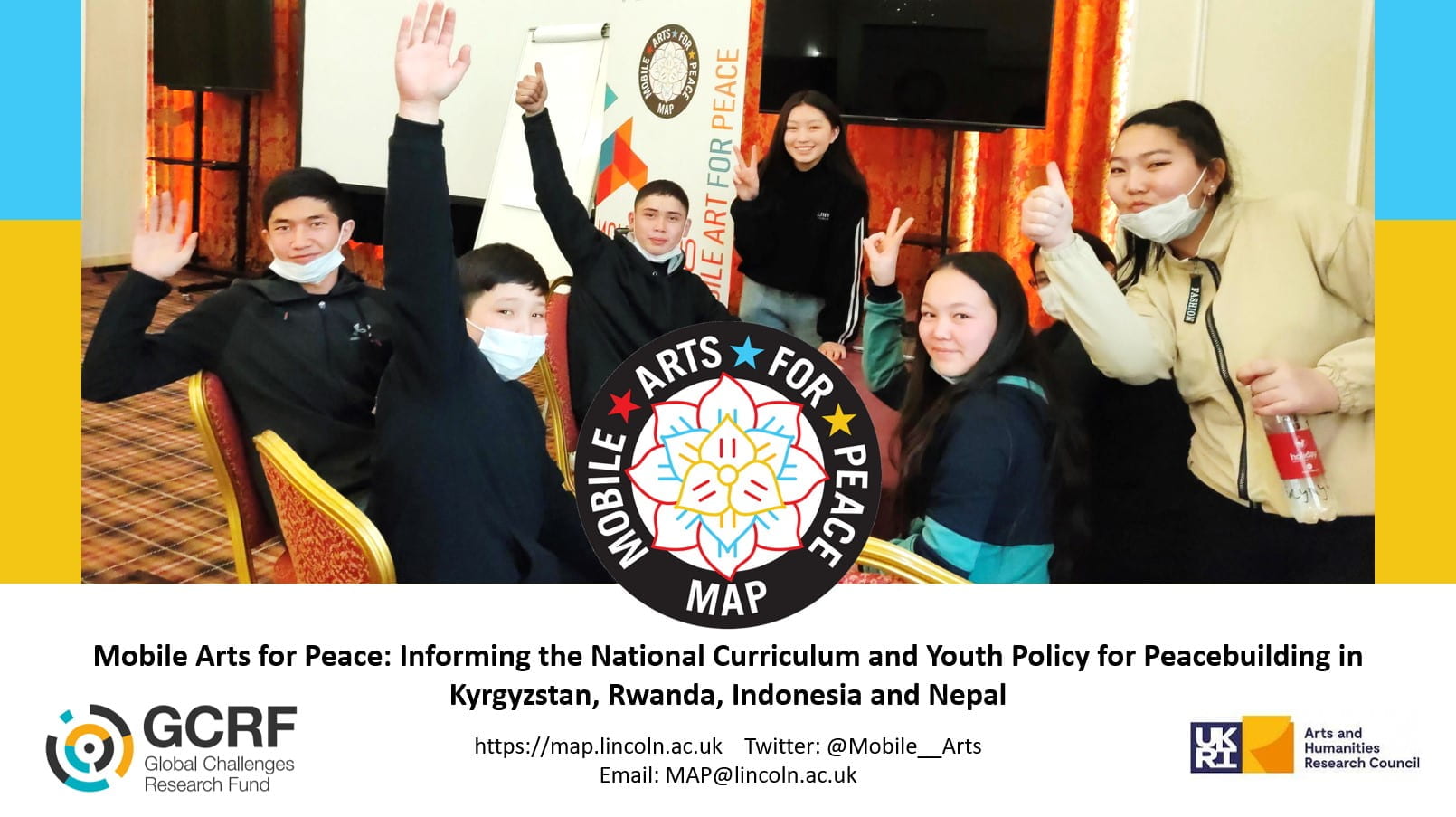Latest posts
- Policy documents: UNICEF Innocenti Discussion Paper on Children and Youth Participation (August 2025) 26 August 2025
- MAP International Online Conference 2025: Session Summaries Report 24 July 2025
- MAP 2025 Conference Highlights: Recordings and Slides 23 July 2025
- Journal article: Reimagining Peace Education in Nepal: Arts-Based, Learner-Centric Pedagogy for Social Justice and Equity 13 July 2025
- Curricula: Mithila art-focused local curriculum in Nepal 2 July 2025
- MAP International Online Conference 2025 1 June 2025
- Policy brief: Gira Ingoma book and policy brief: “The Culture We Want, for the Woman We Want” 28 November 2024
- Manuals and toolkits: GENPEACE Children’s Participation Module in the Development Process 13 November 2024
- Journal article: [Working Paper] Gira Ingoma – One Drum per Girl: The culture we want for the woman we want 30 October 2024
- Curricula: Beyond Tradition: Psychosocial Model 30 October 2024
- Curricula: Beyond Tradition Module: Revitalizing Lenong as a Model for Teaching Betawi Arts 30 October 2024
- Curricula: Beyond Tradition: Lenong Revitalisation as a Model for Teaching Betawi Cultural Arts 30 October 2024
Reflections on Agents of Change Webinar – Ayesha Mohanty
21st July 2022
Caption: Kyrgyzstan’s Team Presentation, part of the Agents of Change Webinar
If you wish to envision the future of world peace, young people from the MAP project shall be your reflective lens. From Nepal to Kyrgyzstan, Indonesia to Rwanda, the young peacebuilders from these regions, equipped with the tools of arts-based research, documented critical issues that they believed impacted their society. Traditionally while these approaches are utilized for peacebuilding endeavors in reconciliation processes, today, there is a need for incorporating the same into preventive efforts and driving more targeted interventions.
In the context of the Agents of Change event on the 24th May 2022 Each project developed by the teams communicated challenges that often went unnoticed in transitional societies and used the skills learned through the Small Grants Project to bridge meaningful participation and partnership for their communities. While navigating through the stigmas and prejudices that marginalized people in their communities face, the teams brought a multitude of creative outcomes. Documented through films, posters, photographs, stories, and comic strips, the young people ensured adequate safeguards by working with skilled professionals such as lawyers, trainers, community leaders, and psychologists to drive their interventions. For example, in a project involving violence against the children of migrants, the members were working with high-risk and vulnerable children prone to anxiety and trauma. Using mitigation measures like involving a psychologist and legal professionals, the team parallelly encouraged legal advice and therapy for those who sought the same. Aside from the mitigation measures, the teams took cognizance of the broader historical context of the region. For example, the project in Nepal identified the ethnic and socio-cultural conflicts that impacted their societies. Integrating a bottom-up approach toward policy intervention, the team used multiple channels for continued advocacy on the issues.
Based on the foundation of the “Theory of Change” analysis, each of the projects reflected a sincere effort to dig deeper into the immediate problems that their communities faced and the existing gaps within the institutional structures – both formal and informal. Through inter-generational dialogues with key decision-makers, they furthered the historical roots of their culture and carried it with a fresh perspective towards the future with the use of social media as a critical channel for communicating their assessments. The event also fostered intercultural learning amongst the team members of different countries and as a member of the audience, one could also identify the common concerns for the protection of the vulnerable and the prevention of the atrocities against those marginalized despite the geographical barriers.
A key highlight for me was the keen awareness and recognition of the diverse socio-cultural factors by young people and their usage in the planning, designing, and implementation of the project based on the arts-based tools. For example, the team in Rwanda took cognizance of the long history of war and conflict that has fractured the society. Involving elements of transitional justice as a part of solutions and recommendations while simultaneously working with the members of the civil society to transform the situation for children was critical. As the teams realize the projects alongside the communities they serve, it is a hope that the documentation of these lived experiences that is often unnoticed realizes into concrete policy efforts by local, state, and national governance.
About Ayesha:
Ayesha is an incoming LLM student at Georgetown University for the academic year 2022-23 on the prestigious Georgetown Merit Scholarship. In the recent past, Ayesha co-lead the Youth Wellbeing team under the UNESCO Youth as Researcher program for the Asia-Pacific Region . Here, she represented both in the Knowledge-sharing Meeting and High-Level Political Conference advocating for the access to mental healthcare within the region for university students with various stakeholders. Her priority interest areas are in security issues, human rights laws and peacebuilding that impact lives of young people through the intersection of mental health, gender and technology.
***
You can also access the whole Webinar recording here

